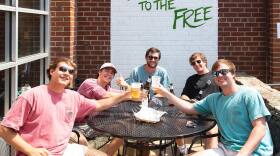Restaurants in Tuscaloosa are changing their business practices due to the COVID-19 pandemic. The risks COVID-19 poses on dine-in customers have forced these restaurants to serve customers through safer alternatives such as curbside and drive-thru.
Andrea Snyder is the owner of the Urban Cookhouse restaurant in Tuscaloosa. She said the restaurant now relies on drive-thru and their food truck, which it may use even after the pandemic ends.
“We have a food truck in Tuscaloosa that has been doing well and kind of been a lifesaver for us,” she said. “You hear people talking about the new normal. Well, if people are getting used to the convenience and curbside and drive-thru and having things brought to them, I think that’s how we’re going to have to adapt.”
The business has maintained these changes well after Gov. Kay Ivey permitted the reopening of restaurants with social distancing restrictions. Additional measures have been taken to ensure the safety of employees and customers.
“Our locations that have drive-thrus, we have a shield, a [safety] glass shield up for extra protection,” Snyder said. “We’re checking temperatures of all of our employees when they come in and sending anyone home who has a fever, which we haven’t had yet.”
Being a chain restaurant, Urban Cookhouse has several locations that have all been impacted to varying degrees by the pandemic. Although the Tuscaloosa Urban Cookhouse has found success in their new business model, others, such as their Downtown Birmingham location, have struggled to stay afloat.
“We hope that we’re going to be able to keep all of them open and basically breaking even, but that one downtown is really questionable, it’s been affected the most,” Snyder said.
Audrey Vermilyea is the owner of Monarch Espresso Bar in Tuscaloosa. She said the bar now uses a walk-up window service, drop-off boxes, and curbside to serve customers, which stray away from what she considers the bar’s core appeal.
“What I would have said was our main thing, main reason people love Monarch, is coming inside and being able to hang out and enjoy the space is not part of the equation anymore,” she said. “We’ve had to shift our business model in a major way.”

The business has successfully transitioned into this new business model. Although they now only make one third of their earnings prior to the pandemic, their current numbers mirror what they would normally earn in the summer.
“[It’s] slower than the school year, but we’ve been able to communicate what we’re doing with customers in a way to kind of get a little bit closer to what we were doing in the past,” Vermilyea said.
She recognized that Ivey’s lifting of statewide restrictions may help businesses struggling due to the pandemic. But she wants to refrain from fully reopening the bar due to the dangers associated with the weaker restrictions.
“Our team is going to be way more exposed just in their regular life,” Vermilyea said. “Whereas before they might have been doing social distancing, now they’re probably going to go out to a restaurant or travel a little bit more. So, our risk as a company has already increased because of even just the small number of people in our team.”
Rajvinder Singh is the owner of La Bamba Mexican Grill in Tuscaloosa. The restaurant currently sells food through curbside and online orders, which are a first for the business.
“We weren’t even using online ordering before, but we had to have that just to [have services as] contactless [as] we could do,” Singh said. “For the customers, we did that.”
According to Singh, customers remain loyal to the restaurant even as they radically shift their business model due to the pandemic.
“[We’re doing] as much as we can, [and] they’re still supporting us,” Singh said. “And they’re not getting upset that we haven’t opened yet. They’re okay with that.”
Even as he refrains from reopening and emphasizes the importance of adhering to statewide restrictions, Singh saw the merit in the recent easing of statewide restrictions and its potential to aid struggling businesses.
“I feel that there are businesses that never will reopen again,” Singh said. “[It is] to try and help them survive even if they can just make it without making [a profit].”

Although many Tuscaloosa restaurants can afford to conduct business during the pandemic, others were significantly hurt by it. The economic impact of the virus has forced some restaurants to close permanently. Bill Lloyd, the owner of the 301 Bistro, Bar, and Beer Garden in Tuscaloosa, submitted a Facebook post discussing his restaurant’s closure and the factors that led to it.
“I have always tried to take care of our employees,” Lloyd wrote. “That is another reason for the timing of this closure. Because of the pandemic, the additional unemployment benefits from both the State and Federal governments will give them much-needed financial stability.”
Walt Maddox, the mayor of Tuscaloosa, warns businesses and the state of Alabama will likely have to wait a long time before they can fully reopen.
“I’m not optimistic that we get back to normal sooner rather than later,” Maddox said. “I think ultimately medical science, though, will determine that. What we’ve got to do in the meantime is be smart about this.”



